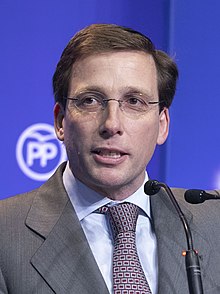Mayor of Madrid
| Mayor of Madrid | |
|---|---|
| Alcalde de Madrid | |
 | |
| City Council of Madrid | |
| Style | The Most Excellent |
| Appointer | Plenary |
| Term length | Four years; no limit. |
| Formation | 14th century |
| Deputy | Lieutenant Mayor (Deputy Mayor) |
| Salary | €106,130.52 (2019)[1] |
The Mayor of Madrid presides over the
As head of government, the mayor leads the Government Board and appoints its members. The mayor is also entrusted with chairing the Plenary meetings, although this responsibility can be delegated to another councilmember.
The office of mayor has a local nature and must not be confused with the President of the Community of Madrid, the leader of the regional government.
History
Initially Mayors of Madrid had the office of '
With
Duties and powers
The mayor has the responsibility to lead the local government and the local administration; represent the City Council; convene and preside over the sessions of the Plenary; manage, inspectorate and boost the local services and public works; dictate regulations; execute the local budget; head the civil service and hire, fire or sanction the personnel at its service; head the Madrid Police; lead the urban planning; exercise all judicial actions to defend the interests of the city; and adopt all necessary measures in case of catastrophe.[5]
Election
The election system of mayors is common to all the country. The citizens vote for the local assemblies or councils on the basis of universal suffrage, with all nationals over eighteen, registered in the corresponding municipality and in full enjoyment of all political rights entitled to vote. The mayor is in turn elected by the plenary assembly, with a legal clause providing for the candidate of the most-voted party to be automatically elected to the post in the event no other candidate is to gather an absolute majority of votes.[6]
Cessation
As in the regional or State governments, the mayor can be removed by a
The mayor itself can also propose a
The general cases of cessation are death, incapacitation or resignation.
Deputy Mayors
The mayor has the authority to appoint, among the councillors that are part of the executive branch, Deputy Mayors (Tenientes de Alcalde). The duties of the deputy mayors are to replace the mayor in cases of vacancy, absence or illness.[2]
Office holders
See also
- Madrid
- Timeline of Madrid history
- History of Madrid
References
- Ayuntamiento de Madrid. 1 April 2019. Retrieved 1 October 2019.
- ^ boe.es(in Spanish) (159). Jefatura del Estado. Retrieved 16 June 2019.
- Cervantes Institute. Retrieved 29 May 2013.
- ISBN 84-87111-54-8. Retrieved 29 May 2013.
- boe.es(in Spanish) (80). Jefatura del Estado. Retrieved 16 June 2019.
- ^ boe.es(in Spanish) (147). Jefatura del Estado. Retrieved 16 June 2019.

